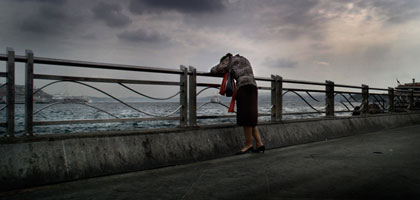Primary navigation

Turkey/France/Italy 2008

Reviewed by Jonathan Romney
Our synopses give away the plot in full, including surprise twists.
Turkey. Servet, a politician, is responsible for a hit-and-run accident. Concerned about his election chances, he pays his driver Eyüp to take the blame. While Eyüp is in prison, his teenage son Ismail is failing in his studies and getting into dangerous company. Ismail's mother Hacer asks Servet for money to buy Ismail a car so that he can start a school transport business. Ismail later discovers that his mother and Servet have begun an affair. Released from prison, a suspicious Eyüp angrily confronts Hacer. She has fallen in love with the married Servet, who is no longer interested in her and warns her to stay away. Eyüp is later questioned by police about the murder of Servet; Ismail confesses to Hacer that he was the killer. Eyüp visits a homeless young man called Bayram, and offers him money to confess to Servet's murder.
A departure from his recent, claustrophobically intimate dramas - Uzak and the marital break-up story Climates - Nuri Bilge Ceylan's Three Monkeys is the latest European art-cinema variation on the film noir tradition, in the lineage that runs from Visconti's Ossessione (1943) to Béla Tarr's The Man from London (2007). The title alludes to the proverbial refusal to see, hear or speak evil, and the central characters - father, mother and son - are caught up in a chain of such denial. The film begins with the father, Eyüp, agreeing to take the rap for his employer's crime; it ends with Eyüp perpetuating the circle of displaced guilt, bribing another biddable innocent to carry a crime apparently committed (although ambiguity remains) by his son Ismail. We never know for sure whether the solitary Bayram accepts the bribe, but a flash of lightning over a cloud-laden Bosphorus skyline - in one of Ceylan's signature cityscape shots - suggests that the moral balance of the film's world remains irreconcilably out of kilter.
Compared to Ceylan's previous impressionistic dramas - the moody Uzak, for example, is a masterclass in the use of 'dead time' - Three Monkeys is a seemingly straightforward crime drama, a story of corruption, passion and vengeance that might have been adapted from James M. Cain or, like the recent Tarr film, Georges Simenon. However, Ceylan and his co-writers - his wife and Climates co-star Ebru Ceylan, and Ercan Kesal, who also plays Eyüp's employer Servet - are audaciously elliptical in their storytelling. The film opens with a traffic accident that we don't see: Ceylan cuts from the distant sound of a crash, deep in the night, to a glimpse of Servet hiding and a couple of passersby driving away, establishing the theme of disavowed responsibility as they shrug off the incident as a matter for the police. Later, the killing of the comprehensively antipathetic Servet - his overdue if indirect comeuppance - is also unseen.
The film is built on such elisions. We never know quite what trouble Ismail is getting into: we only see his bruises and bloodstains. We may guess that something is likely to happen between Ismail's mother Hacer and Servet, when they ride together in Servet's car; but later, like Ismail, we have to put two and two together from the sounds coming from his mother's bedroom. On Eyüp's release from prison, we never see him reunited with his wife: Ceylan only brings the couple together later in a scene of angry, sexually charged confrontation.
The film is equally slippery in its overall structure, shifting from character to character, showing the family together only at the end as all three sit in their flat, heads bowed. After the opening set-up, we assume Eyüp will be central, but he is abruptly removed from play; the drama temporarily becomes Hacer's, then shifts to her son. Ismail in turn drops out so that his decisive act can happen unseen - if indeed he is the killer, rather than claiming the guilt (Eyüp's?) for himself. Only at the very end does Eyüp (a brooding, laconic performance by popular singer Yavuz Bingöl) get his moment. The structure itself reflects the theme of the endless passing on of culpability.
There is another key absence in the film, its tragic weight underlying the fragmentation and mood of sorrow within the family. Another child, a brother to Ismail, died years before and figures as a phantasmal presence in two scenes - in one, as an arm eerily appearing over Eyüp's shoulder to hug him. A soundtrack motif of dripping water suggests the child drowned, but we are left to imagine what happened - and to wonder whether his death explains why Ismail acts as he does, why Hacer seeks love outside the family, why Eyüp agrees to take on Servet's crime in the first place. The machinery of guilt seems to be already in motion before the film begins.
The central triangle of motivations - father's weakness, mother's erotic folly, son's vengeful anger - quietly reaches a pitch of intensity closer to classical tragedy than to classic noir. But Three Monkeys is also shot through with ironies of a more mundane sort - the cruellest being Hacer's deluded attachment to Servet, a callous egotist and fleshily unprepossessing to boot. Like Ceylan's other films, Three Monkeys displays mischievous flashes of sour humour, notably in the ringtone of Hacer's mobile phone, forever going off inopportunely: its popular ballad of unrequited love and vengeance ("I hope despair is always at your door") seems a purely comic effect at first, but increasingly proves pertinent to Hacer's relationships with the three men in her life.
Ceylan gives the film a politically and historically specific setting, one scene showing TV coverage of the 2007 electoral landslide victory of Turkey's AK Party, a centre-right body with strong Islamic support. In contrast to the secular middle-class milieu of Uzak and Climates, this working-class drama has a sparely sketched Islamic background: towards the end, Eyüp visits a mosque, apparently seeking spiritual guidance, then hesitates at a police station before taking a course that flouts both religious and legal orders of justice.
Visually, Ceylan and DP Gökhan Tiryaki push further their achievements with HD texture in Climates. Typically, Ceylan makes inventive use of space, especially when using widescreen to partition up the cramped interiors of the family flat, suggesting the emotional state of three characters who can barely coexist in the same domestic prison. In a starkly reduced palette, colour is largely bled out except for patches of red, notably in the dress that signals Hacer's newly released sexuality. HD photography gives the images an unsettling metallic sheen, enhancing the sense of hard detachment in the film's moral contemplation.